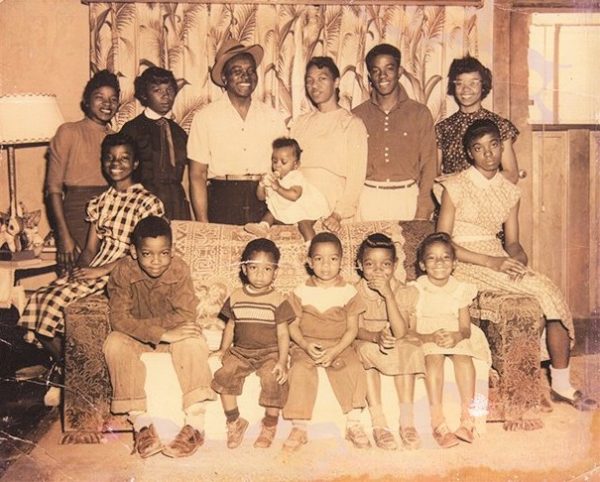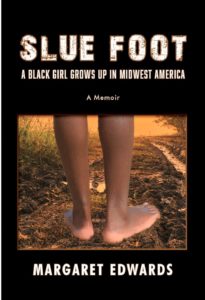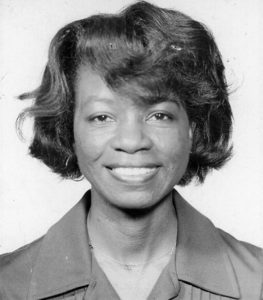Growing up the small city of Mt. Vernon, Ill. in the 1950s and 1960s as one of 15 children, Margaret Edwards didn’t think much about leadership. She knew she liked school, got high grades, was a good singer and prize-winning writer.
Black and female, she knew the sting of discrimination but did not consider herself a victim. And she never thought she would be a world traveler.

Edwards’ new memoir, “Slue Foot: A Black Girl Grows Up In Midwest America,” refers to one of her childhood “flaws,” as she called her shortcomings. Her feet splayed out. Her father called her “Slue Foot.” Her classmates teased her. As Edwards says in her book, “I realized that there were some things I could change and some things I could not. I could change my ‘slue feet.’ All I had to do was turn each foot toward the center and forge straight ahead. And that’s what I did.”
Now retired after a lifetime of teaching around the world at international and embassy schools, the Winter Park resident walks several miles a day with her husband, Robert, and is working on the second book in her memoir series.
“Slue Foot” recounts the first 18 years of growing up in a family of 17. When the local movie theater held a contest with a prize going to the largest family in attendance, Edwards’ mother was determined to win. And win she did. The prize was a plastic picnic set for six.
Born in Mississippi, her father was a farmer who also had talents for construction, mechanics and other assets. When Edwards was four, her father announced that they were selling the farm and moving to Mt. Vernon, Ill., a small city about 75 miles east of St. Louis.
After a series of misadventures, Edwards’ father, Willie T, built a house for the family only to have it burn to the ground a few years later. Not to be outdone by misfortune, he rebuilt bigger and better.
Willie T worked full time in a manufacturing plant and helped everyone in the family, including indigent relatives while supporting the NAACP and his church. He also was very authoritarian. The children were not allowed to play in the front yard, girls could not date boys outside of the house, make records of their singing or relax in the house when there was work that could be done.

The second book in the series, expected in 2022, picks up when Edwards graduates from Southern Illinois University.
“As you recall from “Slue Foot,” I was not sure what I wanted to do with my life. I thought I might be an executive secretary,” she says. “But I wasn’t very good at shorthand or transcribing or typing,” she laughs. “So, I changed my major to history and education.” She was much more successful at that.
A summer in the United Kingdom studying Shakespearean history, followed by another summer at the University of Ghana in Africa and time teaching high school history in the United States, led Edwards to New York and Columbia University in the early 1970s, where she studied guidance and counseling. She chuckles when talking about that time in her life because she also lived, unmarried, with Robert – which caused some shock and much gossip among her family and friends back in Illinois. She graduated with two master’s degrees.
Then one day Robert got a call from India offering him a job as a psychologist at a school in New Delhi.
“I’m not going without you,” he told Margaret. When the school called again, he told them his decision.
“Can your wife teach history?” he was asked.
“Of course, history was my major and I had plenty of teaching experience,” she says.
They were both hired, got married, moved to New Delhi for nine years and began a phase of their lives that saw them eventually work at international schools in five different countries, as well as the U.S.
Margaret and Robert, with their young son and daughter, returned from India to the U.S. “so the children could grow up American,” she says.
Edwards attended Harvard University and after moving to the D.C. area, received her Ph.D. from American University. While there, she served as principal of T.C. Williams High School, made famous in 2000 by the movie “Remember the Titians,” starring Denzel Washington.
But the urge for foreign travel still had hold of them.
“Right after 9/11, we saw an ad for a school psychologist in Hong Kong,” she says. “Robert applied and was offered the job. We dumped our son and daughter at college and flew to Hong Kong.”
She adds sheepishly that they felt so badly about “dumping the children” that they flew back to D.C. from Hong Kong the following weekend to make sure they were OK.
In Hong Kong, Edwards produced popular musical theater productions. The U.S. government asked her to produce a two-man play featuring an American and a Russian who meet as enemies and part as friends. She invited generals from enemies India and Pakistan as guests, hoping they would learn from the play and talk. They did and their discussions brought a measure of peace to the region.
Hong Kong was followed by time in South Africa, four years in Paraguay and then the Sudan. In 2017, they decided to retire.
“Of course, then we were homeless,” Edwards says. “We didn’t know where to start looking.”
The Villages, Sarasota and Fort Lauderdale were on the list.
“We owned a place in the Orlando area, but it took a year to renovate, and we lived in apartments and hotels for a while,” she says.
During that time, Edwards finished writing “Slue Foot,” which was published in March 2021. It is available on Amazon and in select bookstores.

Edwards says she loved every place they lived.
“I did miss the American holidays. We would have Thanksgiving dinners and other celebrations with the other American teachers at the schools,” she says. “I loved India, but you could hardly even make a phone call without booking a time and have the operator connect you.”
With victimhood rife these days, Edwards says she’d not really sure why she chose the other direction.
“I think it must be in my DNA,” she says. “I don’t hold a grudge. There’s no point. I want my energy going somewhere else. Why should I waste it?”
John W Prince is a writer and Villager. For more information visit www.HallardPress.com. If you know of someone with a good story and a good nook,” contact him at John@HallardPress.com.

